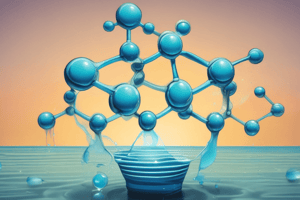Podcast
Questions and Answers
What percentage of the human body is made up of water?
What percentage of the human body is made up of water?
- 50%
- 60% (correct)
- 80%
- 70%
What is the IUPAC name for water?
What is the IUPAC name for water?
- Hydrogen hydroxide
- Oxidane (correct)
- Hydric acid
- Dihydrogen oxide
What is the bond angle between the bonding pair in the water molecule?
What is the bond angle between the bonding pair in the water molecule?
- 110°
- 100°
- 104.5° (correct)
- 90°
What is responsible for the unequal distribution of electrons in the water molecule?
What is responsible for the unequal distribution of electrons in the water molecule?
What is the chemical formula for water?
What is the chemical formula for water?
What is the primary reason behind water's high boiling point?
What is the primary reason behind water's high boiling point?
What is the result of water's high heat capacity?
What is the result of water's high heat capacity?
Why does water remain in the liquid phase despite being above its normal boiling point?
Why does water remain in the liquid phase despite being above its normal boiling point?
What is the reason behind the decrease in water's density as temperature decreases?
What is the reason behind the decrease in water's density as temperature decreases?
What is the primary function of hydrogen bonds in water?
What is the primary function of hydrogen bonds in water?
What is the reason behind water's ability to expand when it freezes?
What is the reason behind water's ability to expand when it freezes?
What is the term for the process in which chemical bonds are cleaved when water is added?
What is the term for the process in which chemical bonds are cleaved when water is added?
Why is water considered a universal solvent?
Why is water considered a universal solvent?
What is the term for the process in which water acts as an oxidizing agent or a reducing agent?
What is the term for the process in which water acts as an oxidizing agent or a reducing agent?
Why does ice float on top of liquid water?
Why does ice float on top of liquid water?
Flashcards are hidden until you start studying
Study Notes
Water Composition
- Water is chemically known as dihydrogen monoxide, with the chemical formula derived from the di- prefix suggesting the presence of two hydrogen atoms and the mono- prefix suggesting the presence of a single oxygen atom.
- Water's IUPAC name is oxidane, and its CAS registry number is 7732-18-5.
Water Molecule Structure
- Each hydrogen atom shares a single electron pair with the oxygen atom, forming a covalent bond.
- Oxygen has two free electron pairs that repel each other, causing the bonding pair (H-O) to push closer together and compressing the bond angle to 104.5°.
- Oxygen's higher electronegativity than hydrogen leads to unequal distribution of electrons, making water a polar compound.
Physical Properties of Water
- Cohesion refers to the mutual attraction of like molecules, with water molecules forming hydrogen bonds with other water molecules.
- Hydrogen bonds are stronger than Van der Waals attractions but weaker than covalent and ionic bonds.
- Cohesion leads to surface tension, causing light objects to float on the surface of water.
- Viscosity, the measure of fluid friction, varies with temperature and pressure, but water is categorized as a fluid with low viscosity.
- Water has a high heat capacity of 4180 J/kg°C, requiring a lot of energy to increase its temperature by 1 degree.
- Water's high heat capacity helps regulate coastal temperatures and makes life under the sea possible.
- Water has a high heat of evaporation, converting liquid to gas phase without altering its temperature.
- Water remains liquid at high temperatures and pressures due to its high boiling point.
Density of Water
- Water exists in all three phases: liquid, solid, and gas.
- Density of water decreases as temperature decreases, with solid water having a lower density than liquid water due to hydrogen bonds creating a crystal-like structure.
Water as a Polar Solvent
- Water is a universal solvent, capable of dissolving the most substances due to its polarity.
Chemical Properties of Water
- Water is amphoteric, acting as an acid or base in different reactions.
- Water acts as an acid when donating a proton and becoming a hydroxyl anion, and as a base when receiving a proton and becoming a hydronium cation.
- Water can also act as an oxidizing or reducing agent in redox reactions, and participate in hydrolysis reactions where chemical bonds are cleaved when water is added.
Significance of Water's Properties
- The unique properties of water make life on earth and in biological specimens possible.
- Water's properties help regulate the human body's temperature, and are essential for the water cycle and capillary action in plants.
Studying That Suits You
Use AI to generate personalized quizzes and flashcards to suit your learning preferences.




